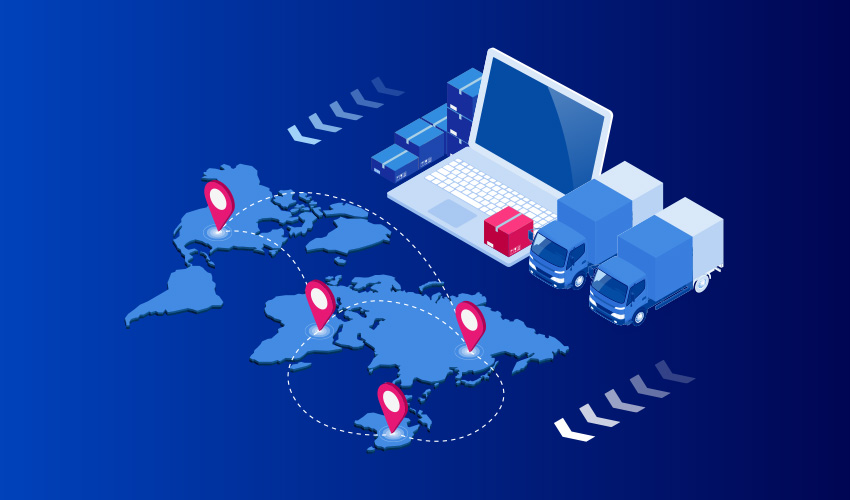Blockchain and supply chain. Do these terms go hand-in-hand? Well, the answer would have been no until a few years back. But now blockchain’s role in supply chain management has become an increasing area of interest as it proves to have the potential to transform the supply chain landscape. In fact, the world even sees blockchain as the most significant invention since the Internet. Dreamy words, but how true are they? Can blockchain technology solve real-world supply chain management risks and challenges? Can this game-changing technology add value to the supply chain business?
So, let’s see how blockchain is transforming the supply chain ecosystem.
Blockchain’s promise outside Fintech
Since its inception, blockchain technology’s application is well known in the financial sector, however, what is less well known is how blockchain can be used across other industries. Non-financial services also stand to benefit through the immutable ledger availability, extensive trusted visibility of the business network, and more efficient transactions.
Blockchain could transform traditional business models and enables automating processes so that businesses can focus more on value-generating opportunities. It transforms the way we exchange value, deal ownership, and authenticate transactions and hence, most businesses (if not all) are beginning to experience its potential. From healthcare to supply chain, many industries are trying to integrate blockchain into their infrastructure.
Blockchain features: A quick overview
Blockchain, the underlying technology behind cryptocurrencies is a shared, immutable ledger that records all the transactions that take place in the network. Interestingly, blockchain technology has certain distinct features which make it a game-changer of the supply chain industry.
Secured
As all the transactions involved are individually encrypted and stored in multiple systems, instead of a single server, it makes your data secured and adds to its authenticity.
Consensus
For any changes to a transaction, all parties must agree, and a transaction becomes valid only with this consensus.
Transparency
The digital record is accessible to all participants in the network and will have a copy of the ledger, making the transactions more transparent.
Immutable
It is impossible to falsify data in the distributed ledger. All validated transactions can’t be altered or reversed as there are multiple copies of each entry.
Provenance
Blockchain helps to record the data history and map the various stages of the data lifecycle, which helps easily track a specific transaction data.
Timestamp
Every transaction recorded is timestamped and hence makes it easy to trace the history of each transaction involved.
Single source of truth
Blockchain provides finality by giving a single version of truth to its participants on all the copies of the shared ledger.
The current complexities in supply chain
Have you ever thought of the entire process involved in the production to distribution stage of your favorite products? Be it your wardrobe collection, footwear, medicines, or food, all of them follow a supply chain process and are tracked down. The supply chain industry is incredibly complex as each shipment passes through multiple people and involves hundreds of transactions across various geographical locations before it reaches the destination. Managing the distribution of goods is no more an easy task in today’s supply chain process.
A successful supply chain completely relies on transparent end-to-end communications and trust throughout the process. Unlike the traditional process which forms a linear chain, the modern supply chain is a multi-tiered system that lacks transparency and traceability. For instance, in case of any illegal suspicion, it becomes very difficult to trace the supply chain due to lack of visibility and inefficient processes. These challenges can impact consumer experience, and, in a way, reflect on the business growth. Another daunting challenge that the supply chain industry faces is its inefficiency, including internal operational errors, logistics, manual techniques, etc.
Interestingly, now, you’ll be able to connect these supply chain challenges with the features of blockchain discussed above. Yes, blockchain can be a one-stop solution to all these supply chain problems.
How blockchain connects the dots for an effective supply chain management
Trust is a key factor in supply chain management, where hundreds or thousands of people/enterprises are involved. Hence, blockchain supply chain management will be able to combat a wide range of challenges. Be it conducting audits or tracking assets, blockchain’s potential cannot be undermined in enabling greater supply chain efficiency. Let’s look into the five ways blockchain solutions will redefine the future of the supply chain industry.
Improving traceability
By mapping and visualizing transaction data, blockchain provides enterprises with real-time, authentic, and immutable data. This is especially vital for food and pharmaceutical supply chains where any fraudulent issues cannot be tolerated. By creating a traceable digital record, blockchain enables you to get true information about the preservation techniques used, genuine list of raw materials sourced.
Executing smart contracts
Unlike signing a contract document, blockchain executes smart contracts, which are programmed to create and run applications on the blockchain. The smart contract can be executed only when the parties involved agree to the terms and conditions. In the supply chain process, smart contracts are programmed to help verify the transaction status and trigger the payment once the contractual commitment is met. As a result, smart contracts improve speed and reduce human errors due to automation.
Reducing transaction costs
By eliminating the need for third-parties, blockchain in supply chain will help cut down the transaction costs. You can completely trust the data in the blockchain even without any authorizing organization. Hence, the time taken to validate the data is less which significantly improves the overall quality and cost reduction.
Increasing speed and efficiency
A blockchain-driven supply chain process by itself will be more efficient with fewer errors and disputes. It helps in accelerating the transaction speed with the elimination of intermediaries and the use of smart contracts. You can even integrate blockchain technology with other technologies for additional benefits. For instance, IoT and blockchain. In a food or pharmaceutical supply chain, the IoT system can get data from the sensors attached and let you know the temperature maintained, or any such environmental factors.
Enhanced Security
Supply chain fraud rates remain at record highs. As per a report released by the UN Global Compact, total fraud losses cost US $2.6 trillion per year. And, what about the unreported fraud cases. With blockchain, you can ensure the secure transfer of goods. Kudos to its features like ‘encryption’ and ‘single source of truth’. Another feature that adds to the security is the hash function. With the hash function, it is impossible to tamper with the data. It acts like a digital fingerprint, where every hash is unique.
Wrapping up
Blockchain without any doubt is a game-changing technology that is worth an investment for supply chains. In fact, enterprise blockchain technology is an investment that promises to generate a handsome return. Smart businesses are experimenting to leverage the benefits of blockchain in supply chain. Want to start yours? Our blockchain experts at Blockedge can help you understand and assess the potential of blockchain for your supply chain businesses. Mary Alex Thelleeran With an endless fascination for words, she is an aspiring business storyteller |
